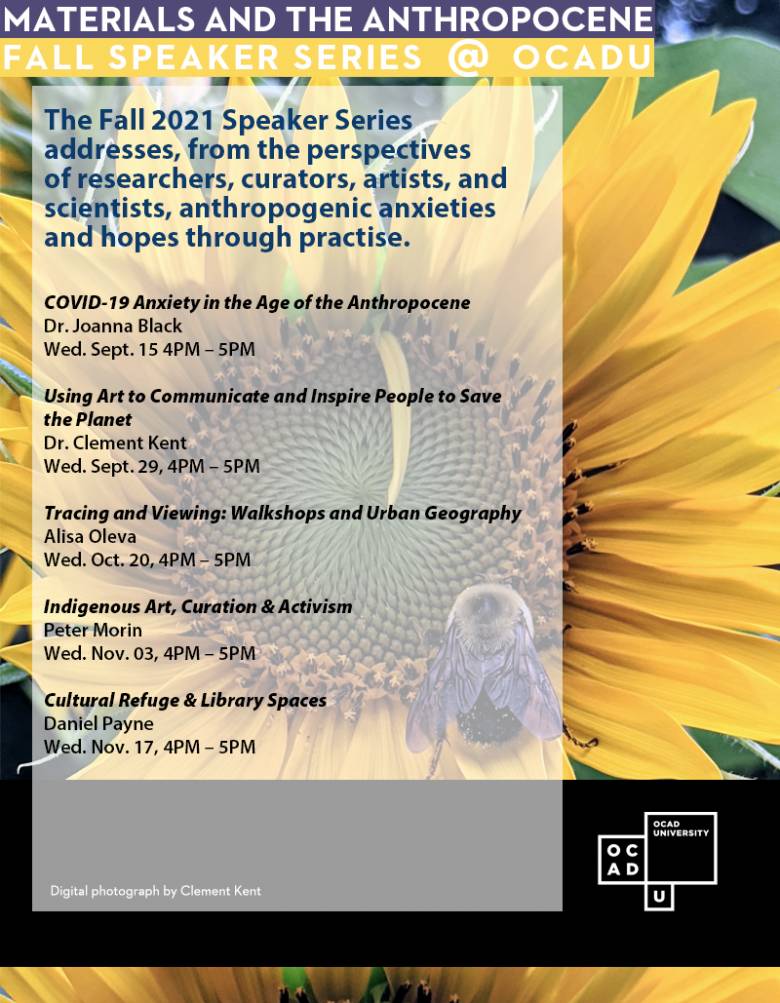
Image credit: Dr. Clement Kent, digital photograph, 2021
Materials and the Anthropocene Fall Speaker Series
as part of the COVID-19 Anxiety Project led by Pam Patterson, Joanna Black, Daniel Payne, Emily Cadotte
https://ocadu.libguides.com/covid_pedagogies/Home
Curators Talk LIVE on Teams, Wed. Sept. 15 4PM-5PM
COVID-19 Anxiety in the Age of the Anthropocene
Joanna Black (BA Fine Arts & English Literature; MA, PhD in Arts Education) has since 1989 been active in visual art as an artist, curator, and speaker. She is a professor at the University of Manitoba in visual art education and is cross-appointed as an Adjunct Professor at the School of Art, University of Manitoba. Additionally, she has been recently (2019-2024) appointed as a Research Fellow at NSCAD University. She has also served as a Senior Artist/Researcher in Residence for the WIAprojects, Center for Women Studies in Education (CWSE), at the Ontario Institute for Studies in Education (OISE) at the University of Toronto.
She currently teaches visual art and digital art education at the University of Manitoba. Black’s research, visual work, curating and teaching have centered creative digital art practices, feminist art, women in academia, human rights issues, learning for social change, and environmental art education. As a result of her research and art making she has published books, articles, reviews in a variety of journals, art catalogues, and exhibition catalogues.
Scientist Talk LIVE on Teams, Sept 29, 4PM – 5PM
Using art to communicate and inspire people to save the planet
Dr. Clement Kent is an adjunct professor in the Department of Biology at York University. He works on pollinators and their plants. He's also vice president of the Horticultural Societies of Parkdale & Toronto, where he works on plants and pollinators and people. He helped start Project Swallowtail, a community collaboration which restores urban Toronto for...you guessed it, pollinators, plants, and people. Finally, he's president of a provincial riding association for the Green Party of Ontario, where he works on helping the plants and pollinators by helping people.
Dr. Kent’s talk will consider what we call "ecosystem collapse"—the loss of the birds and the bees, the flowers and the trees, due to human actions. But as scientists we are not all great communicators. Many people now understand that something has to be done, but they don't know what and need guidance and inspiration. This is where artists can contribute enormously.
The saying "a picture is worth 10,000 words" has never been more true, the need is urgent—we need great art to help deal with urgent problems!
Artist Talk LIVE On Teams, Wednesday Oct 20, 4PM – 5PM
Alisa Oleva: Tracing and Viewing: Walkshops and Urban Geography
Born 1989 in Moscow. Based in London. Alisa Oleva holds an MA in Performance from Goldsmiths. She treats the city as her studio and urban life as material, to consider issues of urban choreography and urban archaeology, traces and surfaces, borders and inventories, intervals and silences, passages and cracks. Her projects have manifested as a series of interactive situations, performances, movement scores, personal and intimate encounters, parkour, walkshops, and audio walks. She has made work site-specifically in various cities: London, Manchester, Leeds, Berlin, Belgrade, Pori, Minsk, Kyiv, Dnipro, Mariupol, Moscow, Norilsk. https://www.olevaalisa.com/
Since the pandemic started what have you not done that you used to regularly? What are the new habits and routes you will take with you to the future and which ones will you leave behind? As all Alisa Oleva’s art projects were cancelled and trips suspended, she started to tune into COVID times to see how this might influence her art practice, exploring how things were changing and what she cared about. In this talk, Alisa will share how her practice has changed during the pandemic and which works she created in the lockdown within the wider context of her art practice.
Artist Talk LIVE on Teams, Wednesday Nov 03, 4PM – 5PM
Indigenous Art, Curation & Activism
Peter Morin is a Tahltan Nation artist, author, curator, writer, and professor at the Ontario College of Art and Design. He was born in Telegraph Creek, British Columbia, Canada and identifies as member of the Crow clan. Morin has completed an MFA at the University of British Columbia Okanagan and a Bachelor of Visual Arts at the Emily Carr University of Art and Design.
In his artistic practice and curatorial work, Morin’s practice-based research investigates the impact zones that occur when indigenous cultural-based practices and western settler colonialism collide. This work is shaped by Tahltan Nation epistemological production and often takes on the form of performance interventions. In addition to his object making and performance-based practice, Morin has curated exhibitions at the Museum of Anthropology, Western Front, Bill Reid Gallery, and Burnaby Art Gallery. In 2014, Peter was long listed for the Sobey Art Prize. Morin held a tenured appointment at Brandon University in the Visual and Aboriginal Arts Department.
Librarian/Researcher Talk LIVE on Teams, Wednesday Nov 17, 4PM – 5PM
Cultural Refuge & Library Spaces
Daniel Payne is currently a faculty member in Library and Information Sciences at the University of Toronto, and was Head of Reference & Instructional Services at OCAD University’s Dorothy H. Hoover Library. He promoted an active, innovative information literacy program at OCAD U that included a site intervention curriculum where studio-based pedagogy was used to facilitate the creation of site-specific works designed to be embedded in the library’s physical space.
By looking to interpretations of space as place, Librarian Daniel Payne will advocate that libraries are essential for navigating our anthropocentric future. With a firm grounding in public values, libraries create cultural refuges that ensure equitable access to the information we need for reacting to the Anthropocene age.